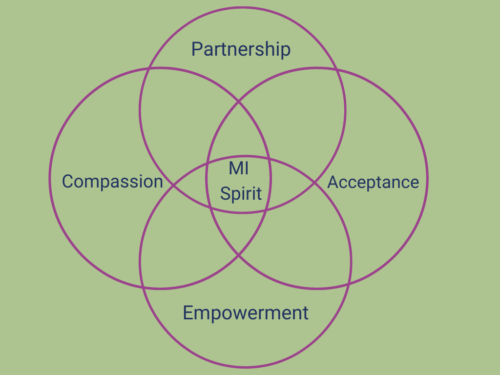How Motivational Interviewing Works: The Spirit of Partnership

This is part 4 in a series of 4 ‘deeper dives’ into the spirit of Motivational Interviewing. If you’d like to check out our blog on the other three elements of MI spirit, compassion, acceptance and empowerment.
Just what is the spirit of Motivational Interviewing?
The new MI book shares, “MI involves not only particular skills, but also an underlying attitude, a particular state of mind and heart with which you engage in a helping relationship” (p.6).
The spirit of MI is the attitude we bring to the work with our clients. It’s about our heart-set and mindset as providers. And when we look at how motivational interviewing works, it all begins with the spirit!!
Today we are deep diving into the spirit of partnership. My favorite little video on this is by Bill Miller that is about being a good guide.
A quote I heard recently that fits this topic is that our goal is to be the ‘guide on the side’ rather than the ‘sage on the stage.’ (Alice Johnson)
As a refresher, here are the four components of the spirit of Motivational Interviewing:

And here’s what we know, from research and from
My personal favorite thing about the spirit element of partnership is that I don’t have to carry the burden of my clients! I don’t have to know it all! I don’t have to try to be an expert in someone else’s life! It’s a relief!!
The Latin root for the word partnership means “a sharing, partition, division, distribution,” and comes from past participle stem of partire which means “to part or divide.”
How does Motivational Interviewing work? Motivational Interviewing is true partnership in action. As a Motivational Interviewer, we recognize there are two experts in the room- you and your client! Yes YOU have expertise. AND… Your client has expertise in their lives, and their values, desires, motivations, and life experience are KEY to any change process!
The mindset of true partnership is about recognizing your expertise + your clients’ expertise = the best possible process AND solutions.
Each of us has an internal experience of what we feel partnership feels like with our clients. We also have an outward expression of partnership.
In my advanced MI class, we are taking a deeper dive into the inner experience and outward expression of each of the elements of the spirit of MI to answer the deeper questions of how Motivational Interviewing works. I wanted to share with you the brilliant notes my advanced cohort came up with related to the MI spirit element of partnership!
Definitions of Partnership: partner on the same ship; 2 or more invested or more people working towards goal(s)
Inner Experiences of Partnership: Personal investment; believing in their success and expertise; deeply valuing who my client is, their strengths, beliefs, values, ideas and motivations.
What would you add to your inner experience of partnership when you are sitting with a client?
Outward Expressions of Partnership: Showing investment, collaboration, seeking their ideas and expertise, valuing what they say, demonstrating accurate empathy, positive nonverbal communication; being on time; being cognizant of height/being on the person’s level; being a vessel of presence and listening; setting an agenda with the person/group; being ‘all in’ with our engagement; work so my client feels heard and seen; being open and accepting.
How do you demonstrate partnership with your clients? What are your ‘outward expressions’ of partnership?
Another important thing to consider is what gets in the way for you personally in embodying the spirit of partnership with your clients? You may have some clients you struggle with letting go of the reins or ‘expert role.’ Advanced class participants named: my fixing reflex, imposing my beliefs, personal frustrations; getting too involved or invested (their problems are my problems); when a client doesn’t have correct info it can pull me into resuming the expert role.
So what helps you re-orient into the spirit of partnership with your clients? This is key to how Motivational Interviewing works!
Participants listed: Staying aware of impulses to take the expert role; being aware of things that may ‘shroud’ the person, and that the person’s ability to partner is always in there; Mindfulness; building empathy & putting yourself in their shoes; keeping the goals client oriented, orienting back to listening and managing my own stress.
Motivational Interviewing Tip of the Week: How does Motivational Interviewing work? It begins to work, first and foremost, with YOUR heart-set and mindset. Practicing the spirit of partnership is a good first step. How do you do this? Remember you don’t have to be the expert in your clients life! You can’t possibly be anyhow! When I orient to true partnership, I embrace humility and get curious about my client to bring them into the driver’s seat of the change process!
Related Posts
No Results Found
The page you requested could not be found. Try refining your search, or use the navigation above to locate the post.
Related Posts

Just what is the relationship between Stages of Change & Motivational Interviewing
Many people confuse the Stages of Change with Motivational Interviewing. They aren’t the same thing, but they work super nicely together. (Fun fact, they both came out around the same time in the early 1980’s!)The Stages of Change, also called the transtheoretical...

Let’s Learn Together!
Hi, I’m Hillary Bolter. At MI Center for Change, Motivational Interviewing is our passion. Motivational Interviewing will help you become more effective and efficient as you support clients’ change!

